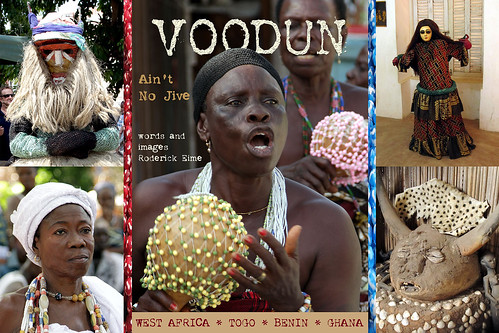“You will travel far and the spirits will guide you safely through many perils,” Anthony whispers into his hands cupping the tiny object. And with that short and sweet blessing, he inserts a tiny wooden pin into the little shaft and presents me with my travelling talisman. Anthony, not his real name I’m certain, looks at me with the satisfaction that reminds me of a triumphant used car salesman.
In his tiny, darkened back room, Dr David Conrad (a PhD in African studies) and I survey the bizarre assortment of fetish idols arranged on the little table. “You won’t find these legba (vodun idols) out in the market,” he says to me through barely moving lips, “these are the real deal.”
David accepts one of the idols with all the solemnity of a holy treasure, only this macabre, roughly carved figure about the size of a premature foetus has none of the beauty associated with divine objects. Its blank gnarly body is covered in coarse dust, cobwebs and lumpy red stains which need no further description. He inspects it briefly and raises his thick wiry eyebrows in my direction. “This one.”
Anthony and I complete the transaction and for about 20 dollars, I have a genuine West African voodoo doll and a couple of sundry talisman in the bargain.
Here in Togo’s Akodessewa Fetish Market hidden away in the backstreets of the capital Lomé, a small contingent of our tour group have ventured inside the compound to examine the piles of desiccated animal remains, withered heads and amputated parts on sale for vodun practitioners and curious tourists alike.
Like in any African market, hopeful young hucksters bound up to us with trinkets and baubles to thrust in our faces. Only here in Lomé, these souvenirs and forget-me-nots are tiny figurines impaled with nails or incomprehensible amalgams of animal parts.
“These are just for the tourists,” Dr David tells me, waving the clambering horde away in broken French. In the secret booths in the rear of the market, you can engage your own witch doctor or clairvoyant to seek a remedy for your ills - or revenge.
Despite centuries of Christian influence all the Gulf of Guinea from Nigeria to Ghana, the art of vodun is practicised in some shape or form in both the cities and villages. When the West African slaves were transported in their thousands from these shores to the Caribbean and Americas, it became ‘voodoo’ – and something else again.
The poignant slave history is the other predominant cultural experience available to visitors to the many sites, now UNESCO recognised, in Ghana, Gambia and Senegal.
Our ship, the MS Expedition, is tracing the western coast of the continent of Africa from Cape Town to Dakar, Senegal, over 24 days. Already we’ve gazed from the dizzying heights of Table Mountain in Cape Town, trudged the abandoned structures of Kolmanskop on the edge of the Namib Desert and investigated the Portuguese colonial remnants of the once worn-torn nation of Angola. Ahead of us are the grisly Ghanaian slave ports of Elmina and Cape Coast where visitors report hearing the ghostly whispers of long departed slaves in the pitch black dungeons.
The coast of West Africa is one of the last remaining parts of the world unexplored by the planet’s inquisitive fleet of adventure vessels. While the larger ships of Cunard and Crystal are comfortable stopping by the safe Namibian ports of Luderitz and Walvis Bay, it’s only recently that adventure cruise operators have deemed Angola, Congo, Sao Tome and the Gulf nations sufficiently crisis-free to allow tourist ship visits.
Even so, all precautions are taken and from Point Noire in Congo until Accra in Ghana, we are joined by three very businesslike ex-Royal Marines who stand vigil while MS Expedition passes through the region where their presence is deemed necessary.
Who else goes there?
Hapag-Lloyd is sending MS Bremen in October for 23 days and while Saga Cruises, Silversea, Lindblad and Zegrahm list the West Coast of Africa as an itinerary, none have scheduled departures at time of writing. Freighter voyages are available too. 40 days return from Amsterdam to Lagos.





No comments:
Post a Comment